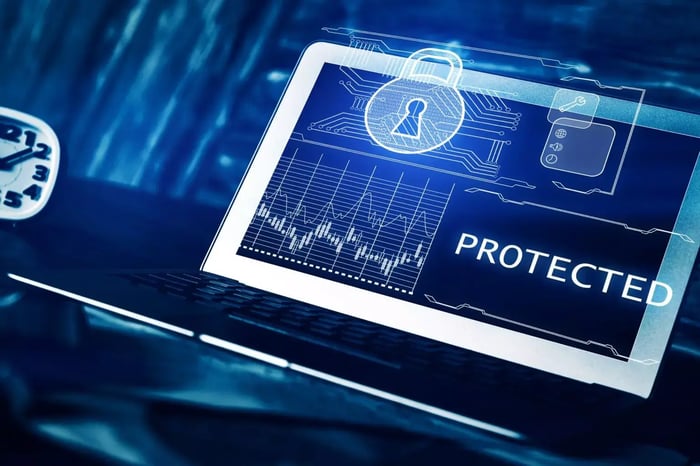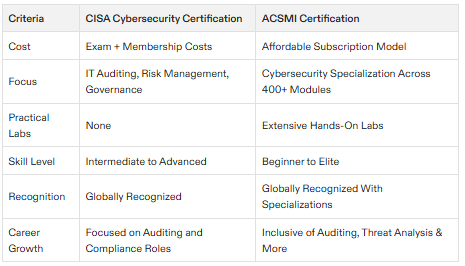Table of Contents
- Why Pursue a Cybersecurity Certification in Canada?
- Top Cybersecurity Certifications in Canada (2025 Edition)
- How to Choose the Right Cybersecurity Certification in Canada
- Final Thoughts
- FAQs About Cybersecurity Certification in Canada
- 1. What is the best cybersecurity certification for beginners in Canada?
- 2. How long does it take to complete a cybersecurity certification?
- 3. Are online cybersecurity certifications recognized in Canada?
- 4. What industries in Canada hire cybersecurity professionals?
- 5. Can I transition to cybersecurity from a non-IT background?
- 6. What are the costs of cybersecurity certifications in Canada?
- 7. What cybersecurity skills are most in demand for 2025?
- 8. Do cybersecurity certifications guarantee a job in Canada?
Are you considering a rewarding career in cybersecurity? Canada is rapidly emerging as a global leader in tech innovation and cybersecurity, with an increasing demand for skilled professionals. As cyber threats evolve in complexity, businesses and government agencies are prioritizing data protection, making cybersecurity expertise one of the most valuable assets in the job market.
One way to gain a competitive edge is through a Cybersecurity Certification Course Free. Obtaining a cybersecurity certification in Canada equips you with the skills and credentials needed to thrive in this growing industry. Whether you're starting from scratch, transitioning from IT, or aiming for leadership roles, certifications provide an excellent pathway to career advancement.
Why Pursue a Cybersecurity Certification in Canada?
Cybercrime is projected to cost the world $10.5 trillion annually by 2025, and Canada is no exception. Businesses, healthcare institutions, financial organizations, and government agencies require skilled cybersecurity professionals to safeguard critical data. Here’s why now is the perfect time to invest in cybersecurity certifications:
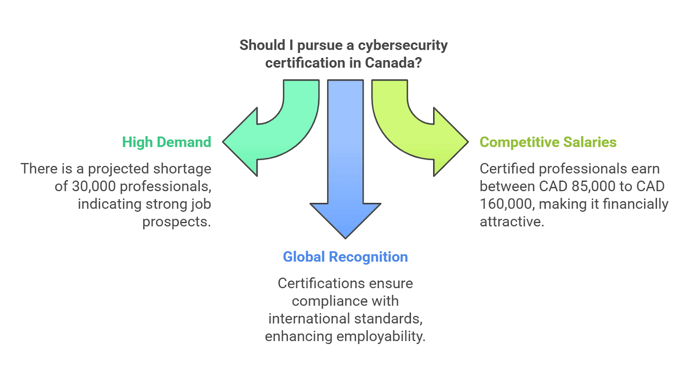
1. High Demand for Certified Professionals
The Canadian Centre for Cyber Security estimates that the country will face a shortage of approximately 30,000 cybersecurity professionals by 2025. Organizations are struggling to fill critical roles, making cybersecurity a highly lucrative and stable career choice. The demand spans across various industries, including finance, healthcare, e-commerce, and telecommunications.
2. Competitive Salaries and Career Growth
Certified professionals earn significantly more than their non-certified counterparts. The average salary for cybersecurity experts in Canada ranges from CAD 85,000 to CAD 160,000, with specialized certifications like CISSP, CEH, and ACSMI boosting earning potential. With cyber threats increasing, employers are willing to pay top dollar for skilled professionals who can secure their networks and data.
3. Global Recognition and Industry Compliance
Many Canadian employers require professionals to hold internationally recognized cybersecurity certifications, ensuring they meet industry standards and compliance regulations such as ISO/IEC 27001, SOC 2, GDPR, and the Canadian Privacy Act. Having the right certification not only improves employability but also enables professionals to work across various industries and geographic locations.
Top Cybersecurity Certifications in Canada (2025 Edition)
Cybersecurity certifications help validate your knowledge and expertise. Below are some of the top certifications recognized by Canadian employers:
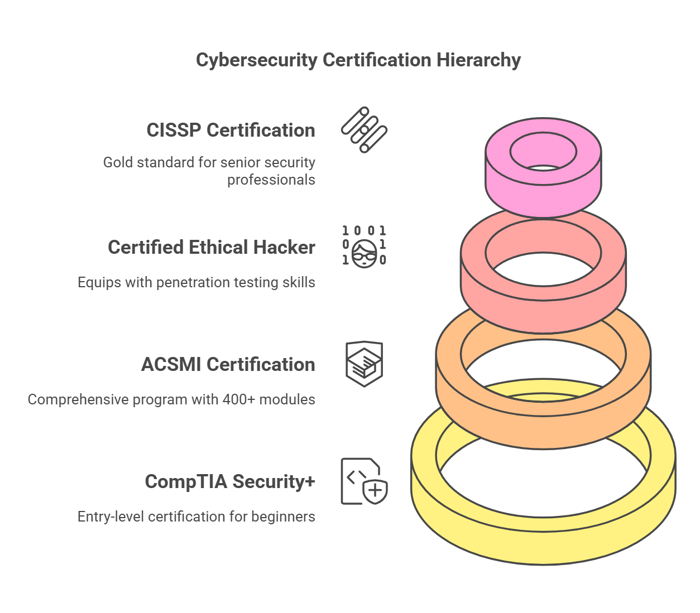
1. ACSMI Certification
(Advanced Cybersecurity Management & Intelligence)
The ACSMI certification is one of the most comprehensive cybersecurity programs available, featuring over 400 modules covering cloud security, malware analysis, penetration testing, AI-driven cyber threats, and more. This certification is ideal for both beginners and professionals looking to upskill.
Key Benefits of ACSMI Certification:
Over 400 modules with real-world applications.
Hands-on labs focusing on threat detection and mitigation.
Globally recognized and ideal for roles in government and private sectors.
Covers emerging threats such as quantum computing vulnerabilities and AI-based attacks.
Self-paced learning, making it flexible for working professionals.
Live training sessions with industry experts to provide real-world case studies.
Visit app.acsmi.org to explore exclusive deals on cybersecurity certification Canada.
2. CompTIA Security+
(Best for Beginners)
A widely recognized entry-level certification, CompTIA Security+ is ideal for those new to cybersecurity. It covers foundational topics such as network security, cryptography, risk management, and incident response. It is frequently used as a starting point for roles such as Security Analyst and Network Administrator.
3. Certified Information Systems Security Professional (CISSP)
(Best for Experienced Professionals)
The CISSP certification, issued by (ISC)², is a gold standard for senior security professionals. It covers risk management, security architecture, and cybersecurity governance, making it a must-have for those seeking leadership positions in IT security management.
4. Certified Ethical Hacker (CEH)
(Best for Penetration Testing & Red Teaming)
Ethical hackers identify vulnerabilities before malicious hackers do. The CEH certification, provided by EC-Council, equips professionals with hands-on penetration testing skills to safeguard businesses from cyberattacks. It includes training on advanced attack techniques, cloud security penetration testing, and network defense strategies.
How to Choose the Right Cybersecurity Certification in Canada
Selecting the right certification depends on your career goals, current skill level, and industry requirements. If you're unsure, a common question is What Cybersecurity Certification Should I Get First? Consider these factors before making a decision:
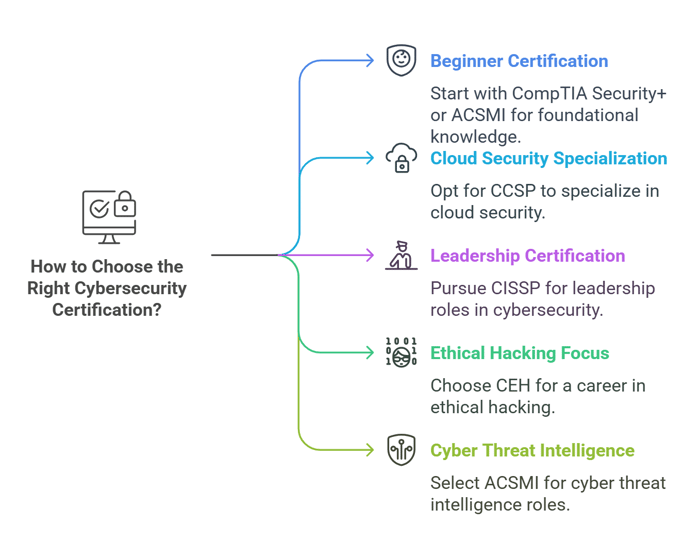
1. Define Your Career Goals
If you’re a beginner, start with CompTIA Security+ or ACSMI.
If you want to specialize in cloud security, opt for CCSP (Certified Cloud Security Professional).
If your goal is leadership, pursue CISSP.
Interested in ethical hacking? CEH is the best choice.
If you want to work in cyber threat intelligence, the ACSMI certification is highly recommended.
2. Recognition & Employer Demand
Ensure the certification is recognized by Canadian employers and aligned with the latest cybersecurity trends, including IoT security, zero-trust frameworks, AI-driven cyber threats, and blockchain security.
3. Cost & Time Commitment
Certifications vary in cost and preparation time. Some programs, like ACSMI, offer self-paced learning, while others require months of study and exam preparation. Ensure you choose a program that fits your budget, learning style, and career aspirations.
Final Thoughts
As cyber threats continue to rise, cybersecurity certifications in Canada are becoming more valuable than ever. By investing in certifications like ACSMI, CISSP, or CEH, professionals can future-proof their careers, increase their earning potential, and contribute to a safer digital world. The demand for cybersecurity professionals is expected to rise steadily, making 2025 an excellent time to enter this high-paying industry.
Visit app.acsmi.org to kickstart your cybersecurity career in Canada today!
FAQs About Cybersecurity Certification in Canada
1. What is the best cybersecurity certification for beginners in Canada?
CompTIA Security+ and ACSMI are excellent starting points for those new to cybersecurity.
2. How long does it take to complete a cybersecurity certification?
Most certifications take 2-6 months, depending on complexity and learning pace.
3. Are online cybersecurity certifications recognized in Canada?
Yes, many Canadian employers accept online certifications from accredited institutions.
4. What industries in Canada hire cybersecurity professionals?
Finance, healthcare, government, telecommunications, and IT sectors actively seek certified professionals.
5. Can I transition to cybersecurity from a non-IT background?
Yes, certifications like ACSMI provide structured learning paths for career switchers.
6. What are the costs of cybersecurity certifications in Canada?
Costs vary from CAD 400-600 for entry-level to CAD 1,000-2,500 for advanced certifications.
7. What cybersecurity skills are most in demand for 2025?
AI-driven security, cloud security, ethical hacking, and blockchain security are key skills for the future.
8. Do cybersecurity certifications guarantee a job in Canada?
While certifications boost employability, gaining practical experience and networking also play crucial roles in securing a job.



